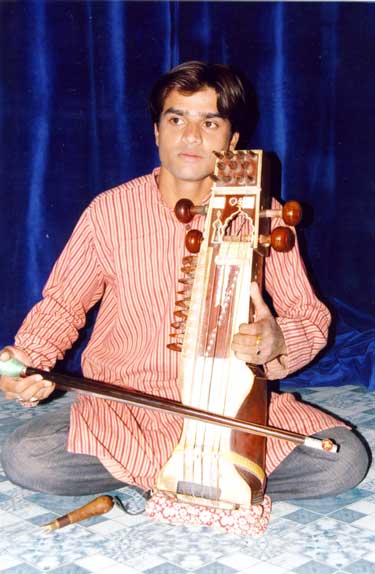
|
Sarangi is a common representative of vitat class of musical
instruments. It has three to four main playing strings and a number
of sympathetic strings. The instrument
 has no frets or fingerboard;
the strings float in the air. Pitch is determined by sliding the
fingernail against the string rather than pressing it against a
fingerboard (like violin). This instrument is extremely difficult to
play, as a consequence its popularity is on the decline. This
instrument has traditionally been associated with the kathak dance
and the vocal styles of thumri, dadra and kheyal. It was also
greatly associated with an Indian version of the geisha tradition,
known as the tawaif. has no frets or fingerboard;
the strings float in the air. Pitch is determined by sliding the
fingernail against the string rather than pressing it against a
fingerboard (like violin). This instrument is extremely difficult to
play, as a consequence its popularity is on the decline. This
instrument has traditionally been associated with the kathak dance
and the vocal styles of thumri, dadra and kheyal. It was also
greatly associated with an Indian version of the geisha tradition,
known as the tawaif.Definition The origin of the term "sarangi" is not exactly clear. The most quoted etymology of the word says that means "a hundred (sau) colours (rang)". The reference to the multiplicity of colours is often said to refer to the richness of the sound of the instrument. However it should be mentioned that this etymology is not universally accepted. Some suggest that it is derived from the Sanskrit word "Sarang" which is a spotted deer; this last etymology seems somewhat doubtful. All of this may be interesting, but what about the instrument itself? The exact definition of the term "Sarangi", is somewhat flexible. In its most general form, it refers to any unfretted, bowed Indian instrument, which has a bridge resting on skin or some other membrane. This term may be acceptable to the lay public, but for practising musicians as well as scholars, this term is unacceptably broad. The general use of the term encompass instruments such as the saringda, chikara, and the kamancha. For these web pages, we will use a more restrictive definition of the term. Therefore in these pages, we will be referring to the more boxlike members of this class, while the other members will be discussed in their respective pages. |
||